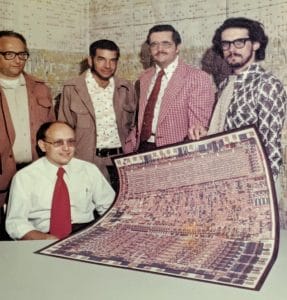After serving in the U.S. Marine Corps and earning his degree in Engineering Physics, Peddle’s first job was with General Electric, working on time-shared computers. In 1973 he moved to Motorola to work on the development of the 6800 microprocessor, which was released in late 1974. Peddle saw enormous potential for lower-cost processors, and urged the company to develop one. At $300, the 6800 would bring huge profits, so the company decisively put an end to that idea. Naturally, Peddle quit and took his idea to work MOS Technology, and led the development of a new low-cost microprocessor. He brought some of his team from Motorola with him, notably Bill Mensch, Rod Orgill, Harry Bawcom, Ray Hirt, Terry Holdt, and Wil Mathys (see photo). Their result was the 6502, introduced in 1975. It cost just $25, which made it the chip of choice for early personal computers.

IEEE’s Chip Hall of Fame put it this way: “When the chubby-faced geek stuck that chip on the computer and booted it up, the universe skipped a beat. The geek was Steve Wozniak, the computer was the Apple I, and the chip was the 6502, an 8-bit microprocessor developed by MOS Technology. The chip went on to become the main brains of ridiculously seminal computers like the Apple II, the Commodore PET, and the BBC Micro, not to mention game systems like the Nintendo and Atari.” It was so cheap, Mensch said later, because its minimal instruction set meant it could be smaller, and its efficient fabrication process “yielded 10 times as many good chips as the competition” — less waste. To help the chip compete with more expensive devices, it gained a speed boost by fetching the next instruction while it executed the current one.
MOS Technology was quickly bought out by Commodore International. Its successor chips are still made today, and there are hundreds of millions of them in all sorts of devices. Peddle and Mensch are regarded as personal computer pioneers as both the 6502 technology and business model were instrumental in helping launch the personal computer revolution. Mensch, 74, lives in Arizona. Charles Ingerham “Chuck” Peddle died December 15, and was probably 82.
